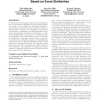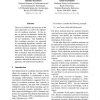121 search results - page 1 / 25 » Hypothesis generation and ranking based on event similaritie... |
SAC
2010
ACM
13 years 11 months ago
2010
ACM
Accelerated by the technological advances in the domain, the size of the biomedical literature has been growing rapidly. As a result, it is not feasible for individual researchers...
COLING
2008
13 years 5 months ago
2008
The use of similarities has been one of the main approaches to resolve the ambiguities of coordinate structures. In this paper, we present an alternative method for coordination d...
IJSR
2010
13 years 2 months ago
2010
Abstract— People in densely populated environments typically form groups that split and merge. In this paper we track groups of people so as to reflect this formation process an...
IPM
2006
13 years 4 months ago
2006
How to merge and organise query results retrieved from different resources is one of the key issues in distributed information retrieval. Some previous research and experiments su...
CIKM
2009
Springer
13 years 11 months ago
2009
Springer
Many applications in structure matching require the ability to search for graphs that are similar to a query graph, i.e., similarity graph queries. Prior works, especially in chem...


